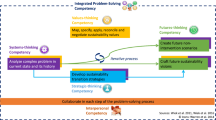Abstract
The main goal of environmental education program developers is to train resourceful experts to work, study and solve environmental issues. Thus, it is essential to conform educational knowledge and skills according to countries needs along with scientific and technological progress. The present study aimed to assess needs of educational programs by considering climate change issues in Iranian Universities. Therefore, needs of higher education sector have been identified and some recommendations were given in line with objectives of training programs. The study applied random selection method to determine a number of environmental professionals to answer the designed questioner. Delphi method was used for needs assessment. Consensus of experts, descriptive statistics, t test and analytical hierarchy process were used to analyze the collected data. Findings relevant to consensus of experts demonstrate the environmental and climate change education in related and unrelated environmental disciplines. The greatest degree of importance belongs to reforming educational deficiencies and introducing new courses on environment and climate change to unrelated disciplines.


Similar content being viewed by others
References
Aghajani Y, Abbaspour M, Mohammadi A, Reza Soltani S, Aghajani D, Ahmadi A (2016) Resilient cities, a key solution to safeguard the environment. Sci Iran 23(5):2067–2076
Ahmadi A, Abbaspour M, Arjmandi R, Abedi Z (2015) Air Quality Risk Index (AQRI) and its application for a megacity. Int J Environ Sci Technol 12(12):3773–3780
Ahmadi A, Abbaspour M, Arjmandi R, Abedi Z (2016) Resilient approach toward urban development in lake catchments; case of Lake Urmia. Sci Iran 23(4):1627–1632
Allan P, Bryant M (2011) Resilience as a framework for urbanism and recovery. Landsc Archit 6(2):34–45
Allan P et al (2013) The influence of urban morphology on the resilience of cities following an earthquake. Urban Des 18(2):242–262
Anon. (2012) Disaster resilience: a national imperative. The National Academies Press, Washington, DC
Chaffin BC, Gunderson LH (2016) Emergence, institutionalization and renewal: rhythms of adaptive governance in complex social-ecological systems. J Environ Manag 165:81–87
Cordero E (2000) Misconceptions in Australian students’ understanding of ozone depletion. Melb Stud Educ 41:85–97
Daneshvar MM, Ebrahimi M, Nejadsoleymani H (2019) An overview of climate change in Iran: facts and statistics. Environ Syst Res 8:7
Eneji C-V, Akpo DM, Edung AE (2017) Historical groundwork of environmental education (fundamentals and foundation of environmental education). Int J Contin Educ Dev Stud (IJCEDS) 3(1):110–123
Falaye FV, Okwilagwe EA (2016) Assessing the senior school students’ knowledge, attitude and practices related to climate change: implications for curriculum review and teacher preparation. J Int Soc Teacher Educ 20(1):43–53
Heidari F, Heidari M (2015) Effectiveness of management of environmental education on improving knowledge for environmental protection (case study: teachers at Tehran’s elementary school). Int J Environ Res 9(4):1225–1232
Karataş A (2016) Environmental impacts of globalization and a solution proposal. Am Int J Contemp Res 6(2):64–70
Kim D, Lim U (2016) Urban resilience in climate change adaptation: a conceptual framework. Sustainability 8(5):405
Luo F, Liu Y, Peng J, Wu J (2018) Assessing urban landscape ecological risk through an adaptive cycle framework. Landsc Urban Plan 180:125–134
Masnavi M, Gharai F, Hajibandeh M (2019) Exploring urban resilience thinking for its application in urban planning: a review of literature. Int J Environ Sci Technol 16:567–582
Moharamnejad N, Heydari O (2007) Developing a sustainable development management model for environmental education for the young generation. J Environ Sci Technol 8(1):68–77
Müller F, Bergmann M, Dannowski R, Dippner JW, Gnauck A, Haase P et al (2016) Assessing resilience in long-term ecological data sets. Ecol Indic 65:10–43
Pachemska TA, Lapevski M, Timovski R (2014) Analytical hierarchical process (AHP) method application in the analytical hierarchical process (AHP) method. Gabrovo, s.n., pp II-373–380
Sasana H. Prakoso J, Setyaningsih Y (2018) The impact of globalization agains environmental condition in Indonesia. Semarang, s.n
Ribeiro PJG, Gonçalves LAPJ (2019) Urban resilience: a conceptual framework. Sustain Cities Soc 50(2210–6707):101625
Salehi S, Pazooki Nejad Z (2014) Social assessment of knowledge of non-meteorogical students with respect to climate change. Res Geo Sci 14(33):193–215
Shahroodi K, Keramatpanah A, Amin S, Haghighi K (2012) Application of analytical hierarchy process (AHP) technique to evaluate and selecting suppliers in an effective supply chain. Kuwait Chapter Arabian J Bus Manag Rev 1(6):119–132
Shobiri SM, Meiboudi H (2013) The evolution of environmental education in Iran: presenting some suggestions for its promotion. Environ Sci 11(1):119–130
Sotoudeh A, Parivar P (2016) Applying resilience thinking to select more sustainable urban development scenarios in Shiraz, Iran. Sci Iran 23(5):1975–1983
Spaans M, Waterhout B (2017) Building up resilience in cities worldwide—Rotterdam as participant in the 100 Resilient Cities Programme. Cities 61:109–116
Tripathi KP (2011) Decision support system is a tool for making better decisions in the organization. Indian J Comput Sci Eng 2(1):112–117
Vidal LA, Marle F, Bocquet JC (2011) Using a Delphi process and the Analytic Hierarchy Process (AHP) to evaluate the complexity of projects. Expert Syst Appl 38(5):5388–5405
Wang X, Bai H, Shi Y (2011) Application research of analytic hierarchy process in the evaluation of college cadres. Springer, Berlin
Wu J (2014) Urban ecology and sustainability: the state-of-the-science and future directions. Landsc Urban Plan 125:209–221
Acknowledgements
This study was supported by Iranian National Science Foundation (INSF) with Grant Number of 91003781 and their contribution is much appreciated.
Author information
Authors and Affiliations
Corresponding author
Ethics declarations
Ethical approval
All procedures performed in studies involving human participants were in accordance with the ethical standards of the institutional and/or national research committee (Dr. Kazem Alavipanah, Dr. Madjid Abbaspour, Dr. Alireza Kani) and with the 1964 Declaration of Helsinki and its later amendments or comparable ethical standards.
Additional information
Editorial responsibility: M. Abbaspour.
Rights and permissions
About this article
Cite this article
Ahmadi, A., Abbaspour, M. & Afkhami Namin, N. Assessment of Iran academic environmental education needs with climate change approach. Int. J. Environ. Sci. Technol. 18, 49–56 (2021). https://doi.org/10.1007/s13762-020-02850-6
Received:
Revised:
Accepted:
Published:
Issue Date:
DOI: https://doi.org/10.1007/s13762-020-02850-6




